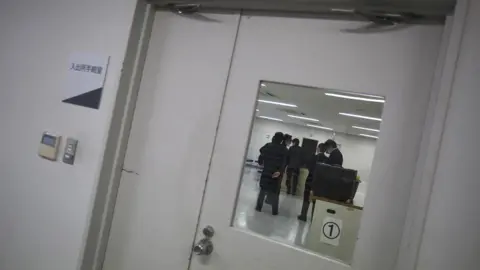Japan pulls controversial asylum seeker bill after criticism
 Reuters
ReutersJapan's government has withdrawn a controversial immigration bill after mounting public criticism.
Debate over the bill had in part been sparked by the recent death of a young Sri Lankan woman held in an immigration detention facility.
The bill would have made it easier to deport failed asylum seekers and given more power to immigration authorities.
Japan has a significantly lower rate of accepting asylum seekers than other developed countries.
The legislation was largely aimed at dealing with the long detention of asylum seekers after their applications failed.
Currently, deportations cannot be enforced while an asylum application is still pending and there is no limit to how many times refugees can renew their applications.
The proposed bill would have allowed asylum seekers to file only two applications before being deported, unless there was new justification for a third consideration of the case.
But while the government said the proposed bill would address the long detentions of refugees, activists and lawyers said it went against international norms.
The UN High Commissioner for Refugees praised parts of the bill yet said that other aspects raised "very serious concerns".
The government's withdrawal of the bill comes in the face of mounting public attention and pressure over the issue, sparked by a recent tragic death of a woman held in immigration detention.
Although not an asylum seeker, the case of Wishma Sandamali put the spotlight on Japan's overall treatment of immigrants.
The 33-year old died in early March in a facility in Nagoya. According to Japanese media, she went to the police in August 2020 seeking help for domestic violence but was then detained for overstaying her visa.
The case was picked up by activists to sound the alarm over the situation in Japans immigration detention centres.
The public backlash against the bill comes at a time where popular support for the government is already at a low due to criticism of its sluggish response to the Covid pandemic.
Opinion polls see Prime Minister Yoshihide Suga struggling, while a number of local elections are scheduled later this summer as well as a general election due in October.
Japan's strict asylum regulations result in fewer than 1% of applicants being accepted each year. This is significantly less than other developed nations like the US or European countries where the acceptance rates are between 30% and 40% or higher.
